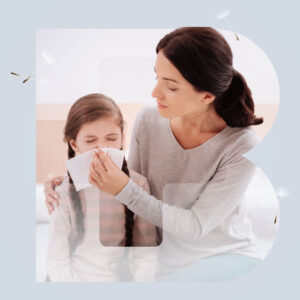Regardless of the season, when the weather changes – unpredictably sunny, rainy or cold – it can trigger your allergies. The number of sufferers in this category is trending upward. So, with proper understanding and preparation, it is possible to lessen the impact of the allergies; as otherwise you will have to endure their many effects – difficulty breathing at night or when it rains, lack of sleep, swollen eyelids, drowsiness throughout the day.
What is weather allergy?
Weather allergy, or allergic rhinitis, is a reaction of the nasal tissue when it comes into contact with an allergen and a sudden change in the weather. The condition irritates the nasal cavity, leading to inflammation and other subsequent symptoms. This can occur in anyone, regardless of gender and age. Though weather allergy is not life-threatening, it can be aggravating and interfere with the normal daily life. However, if left untreated, the allergy can lead to rhinosinusitis later. Also, hereditary plays an important role in the cause of weather allergy.
What are the symptoms of weather allergy?
Noticeable symptoms of weather allergy are as follows:
- Sneezing
- Itchy and blocked nose, nasalized sound
- Runny nose
- Crease marks along the ridge of the nose due to rubbing
- Itchy and sore eyes
- Itchy ears, ringing noise in the ears, soreness at the back of the ears
- Nasal discharge running down the throat, sore throat, chronic coughing
- Nose bleed
How is weather allergy diagnosed?
In diagnosing weather allergy, your doctor will check your health history and enquire about your symptoms in detail. The doctor will then examine your nasal cavity to observe any swelling, the color of the mucus, as well as any reddish blister in your throat and the darken lower eyelids. The examination may also include skin prick test to aeroallergen, specific IgE blood test, etc. All these tests will be under your doctor’s advice only.

How to treat and prevent weather allergy?
- Avoid any airborne allergen (from the above test results).
- Avoid airborne pollution, wear a face mask when outdoor, use air purifier.
- Use nasal rinse to remove mucus and allergens.
- Apply steroid nasal spray to subdue the inflammation only during a specific length of time, and do not persistently use nasal spray for acute sinusitis.
- Use antihistamine medication to relieve the symptoms as needed.
- Allergen specific immunotherapy. This is vaccination to treat the root cause of your allergy, by enhancing your immunity so that it can deal with the allergen. It requires a long-term persistent treatment under the close care of an immunologist.
- Surgery, as prescribed by your doctor in more severe cases or when there is another comorbidity – such as nasal polyp, deviated nasal septum, chronic sinusitis, etc.
- Maintain a good health, nutritious diet, and regular exercises.
What are the impacts of weather allergy?
When you suffer from weather allergy and some other conditions (e.g., asthma, conjunctivitis, acute or chronic sinusitis, middle ear infection, insomnia, sleep apnea, etc.) also arise, the symptoms can become more severe. So, it is best to consult a doctor and receive a treatment promptly. Do not ignore the condition for long, as it can become a chronic health issue that interferes with your daily life. More importantly, an asthmatic condition that has not been properly addressed, it can lead to respiratory system failure or, even, death.









